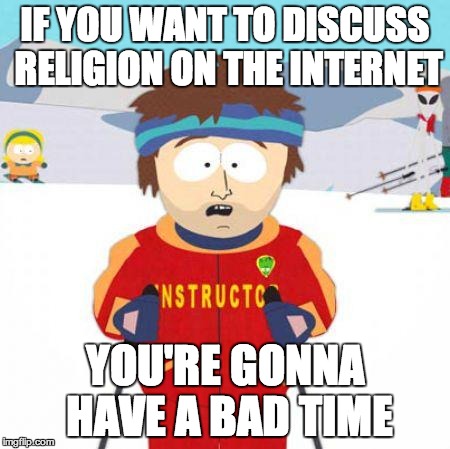Bacon is fluffy
Wut'n th'name of davy jonez lockr is uh sall-add?
1. But that's where you are wrong about christianity, and many other religions if not all actual religions, as a whole. You CAN'T just believe in whatever you want.
2. To begin with, religion is a an attempt to understand reality.
3.Hence the comparison to science, which also is one, as is philosohy and I imagine other things.
4.We can't just cherry pick whatever, and you can't put religion in a box that says "meaningless" or "silly" just because it is capable of changing.
5.Because you and I and everyone else are not omniscient.
6. If religion was immutable, and if there were not different interpretations then it WOULD be silly.
7. Because our religious beliefs have to be actual beliefs.
8.Have to be things we can actually understand as facts. If my experience diverges from yours, which it obvioulsy will, then naturally the things I know will differ from the things you know and therefore my filter for what can or not be believed in will be different. Which is pretty much the opposite of your accusations.
1. List of Christian denominations by number of members - Simple English Wikipedia, the free encyclopedia
Sure seems like it to me. Religion is all based on your beliefs. When you can just believe on whatever you want, it hurts your own cause. You want to say this,but look at how many sects there are just on this wikipedia page. Now if you're telling me all these sects are right, then something is wrong.
2. A very primitive attempt that isn't grounded in reality.
3. Depends on what you call science. Scientific have proven that antibiotics cured the bubonic plague while whipping yourself in attonement hasn't. Scientific research has gone on to finding out why some people are men(23rd pair of chromsomes XX) and women are Xy. As for philosphy, they are on the same level of religion. I appreciate philosphy's aims,but at the end of the day it's merely a web of thoughts that have been conveyed to explain something. Which is the same as religious belief.
4. I can and have put it in those boxes. Who are you to tell me I can't have that opinion of religious belief? My initial serious post in this thread is in defense of your fairy tales, but that doesn't change the fact that they are fairy tales.
5. Doesn't mean anything. Unless its in defense of your beleifs. Which I don't care for.
6. Ofcourse its silly that there are different interpretations. It's just the result of fragmented continents with their own populations who developed their own systems of beleif. Sun gods, ragnarok, titans, devils, angels, and monotheistic gods. All these people are free to believe what they want. There are certain benefits that come from the meaning that religion gives people. But the fact that you're telling me that it's not silly is silly in itself and only reinforces the futility of this conversation.
7. People can believe the united states is cultivating a rape culture,but until there's proof of that culture being cultivated, it's just hysteria. The facts don't care about your beliefs and neither do I.
8. Your experience means nothing to me other than it being a talking point for us to start a conversation. In all honesty, I would love for scientists to actually work toward proving we have a soul. You don't even have to address god, just prove we have an undying soul that is separate from our bodies. If scientists are trying to prove the existence of dark matter by trying to find traces of it by using the earth's crust as an actual filter to slow it down enough to theoretically catch a glimpse of it. Then surely technology one day will be able to definitely find out if we have a separate self. Until that day, it's just a belief. A belief is not fact. A belief is just something to give your life meaning and to explain things that don't make sense to you.
Me? I will never dabble in belief other than having a certain stance on topics that aren't clear cut. If that means my life loses meaning, then so be it. It is the path I've chosen and these are seeds that I sowed years ago. However on this topic where you're telling me I can't call your beleifs silly, is in itself silly. It's certainly rude to be blunt and not care about your feelings, but I can say and think whatever I want just like you.



